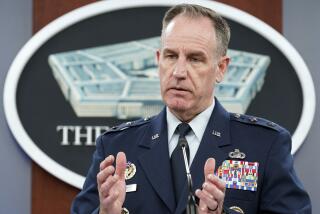Low Inflation Makes Pentagon ‘Flush’ With Funds, Aspin Says
- Share via
WASHINGTON — The Democratic Party’s chief defense expert in the House charged Sunday that the Pentagon is “flush” with funds and has netted more money than President Reagan requested when he entered office and began his $1.6-trillion defense buildup.
Armed Services Committee Chairman Les Aspin (D-Wis.) said in a statement that lower-than-expected inflation has helped create a windfall for the military. “The Pentagon has actually gotten more real resources than requested in 1981,” Aspin said. “The Defense Department is flush.”
Aspin’s salvo, which he planned to underscore today with a detailed speech on the House floor, comes as House and Senate conferees prepare to resume their thus far fruitless efforts to reach a compromise on a fiscal 1986 budget.
Both chambers have voted plans that would cut $56 billion from the Administration’s original request, but they approach the cuts differently. The Senate would allow defense spending to rise 4% over current levels but would temporarily freeze Social Security benefits. The House froze defense spending but adopted a hands-off approach on Social Security.
Aspin’s remarks followed a charge he made in May that the Pentagon had received $18 billion to $50 billion in extra funds in the last four years to compensate for inflation that never occurred.
In a June 10 letter to Aspin, Defense Secretary Caspar W. Weinberger estimated the inflation-related savings at an even larger $61.7 billion but argued that much of the amount had already been cut from defense budgets by Congress and could not be considered a “windfall.”
However, Aspin said he and Weinberger were comparing two different sets of figures. The senator, using numbers that he said were gleaned from Weinberger’s June response, said the Administration got only $26.7 billion less than it wanted for defense programs from Congress between fiscal 1982 and fiscal 1985. He insisted that those cuts were more than compensated for by the inflation-related bonus of up to $50 billion.
More to Read
Get the L.A. Times Politics newsletter
Deeply reported insights into legislation, politics and policy from Sacramento, Washington and beyond. In your inbox twice per week.
You may occasionally receive promotional content from the Los Angeles Times.










